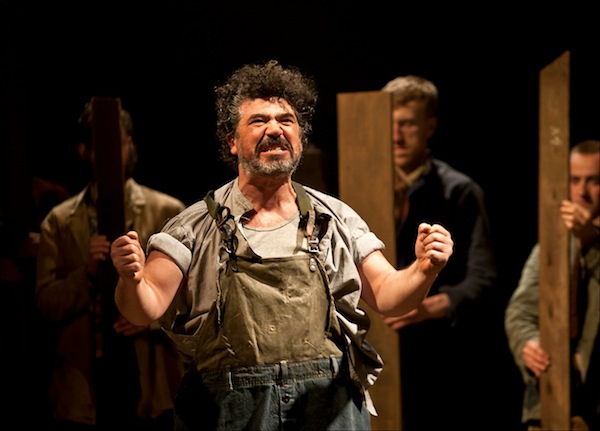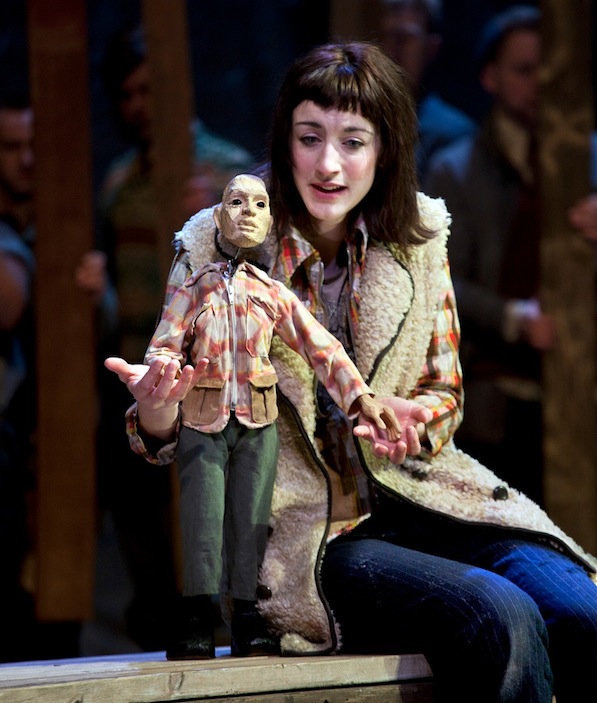Shakespeare’s A Midsummer Night’s Dream is the kind of title and play that conjure up visions of luminous little fairies dancing under a full moon in a magical woodland dell. The moon is there all right at the Broad Stage in Santa Monica, but the dell? Not so much.
And yet.
Since the mantra of all theatre is “Astonish me!,” it is joyful to report that this Bristol Old Vic production of Midsummer is both bracing and entirely astonishing in its bold and purely proletarian way, holding audiences in a most unexpected thrall. Let’s call it the highly imaginative working-class version of Shakespeare’s comedy, which may explain why its Mechanicals stand out so triumphantly in this concept.
The Bristol Old Vic is the company that gave the world the exhilarating theatrical staging of War Horse, in association with the Handspring Puppet Company of South Africa. So it’s not surprising that the company has joined up again with the Cape Town puppet guys for this quixotic Midsummer. The director is again War Horse’s Tom Morris, and while there are no rideable creatures in this production — except for one masterful semi-human one to be more fully identified later — there is an earthiness and élan vital to the proceedings that make up for the few (very few) false notes.
Start to finish the production takes place on a set reminiscent of a messy art studio that hasn’t been swept or organized in months (the overall designer is Vicki Mortimer). Assorted tools, prominent wooden planks and oddments of “things” lying around fungibly fulfill all of the required environmental elements — most notably the trees in the “wood outside Athens” where so much of the action occurs, all of it bathed in a silvery moonlight glow by one Philip Gladwell.
In a similar vein the, shall we say, egalitarian costumes are Contemporary Sloppy or whatever tumbled out of the drier that day. Theseus (the stately David Ricardo-Pearce) and Hippolyta (Saskia Portway, androgynous and enigmatic) become distinguished by carved, oversized hand-held heads with gleaming eyes, and one articulated hand when it’s time for them to double up as Oberon and Titania, respectively — regal roles that they fulfill with more deliberation than the seething animosity that their quarrels sometimes require.
They leave seethiness and animosity to the very young and very confused quartet of lovers at the heart of this play who ultimately dazzle us with a furious display of grit, fun, bristling energy and kick-ass vigor. When Puck (here an unlikely assemblage of what looks like a small acetylene torch, a fork, a handsaw and an upside-down basket whose handle makes for a very big mouth) screws up and puts the magic drops in the wrong lovers’ eyes, the pandemonium that erupts among Lysander (Alex Felton), Hermia (Akyia Henry), Demetrius (Kyle Lima) and Helena (Naomi Cranston) is inspired in its choreography, at once hilarious and winning. The feisty Henry, shortest of the lot as befits the role, demonstrates that she is also the most redoubtable.
Which brings us to the Mechanicals. Driven by the tireless Miltos Yerolemou as Bottom the Weaver, a stocky, boisterous fellow who’d gladly play all the parts, this hapless group of tradesmen turned wannabe actors provides the second-most inventive quotient of the production. Carpenter, joiner, bellows-mender, tinker and tailor are to be commended for some expert comic timing, topped by Yerolemou’s whirligig bravado and, when he comes under Oberon’s malicious spell, walks away — rolls away? — with a gutsy tongue-in-cheek equation between his name of Bottom and the Ass he has become. The resulting lunatic contraption delivers a raft of surprises I can guarantee you’ve never seen before.
Stimulating stuff? Very. Unexpected? Utterly. Which does not mean all aspects of the production work well all of the time. Such a departure from expectations is bound to be both good and, well, less good. The handheld puppets tend to slow things down. Certainly the Bottom/Ass gag is a point where the play caves in to an irresistibly perilous idea. How irresistible? Enough that we don’t quibble.
Unavoidably though, such hijinks also mean that the high level of lyricism in this play is undermined in places where we wish it were not. The concept’s extreme originality swallows up some of the language’s best eloquence. But a stretch of haunting a cappella humming restores some of the magic (composer is Dave Price), and it’s impossible to not be seduced by fairies that consist of colorful parasols with ribbon tentacles that make them look like elegant jelly-fish — or a flying creature (bug?) whose wings are small sails and whose body, head to tail, is a single unadorned pair of pliers.
Those are just a few descriptions of the company’s many wild creations. Most of the time the wit of the unusual approach compels us to forgive those moments when we have to question whether the puppetry is accommodating the play or the play is accommodating the puppetry. A significant question.
So purists beware: this staging may not be for all markets. But in the end, it really does not matter. The opening night audience — that unreliable barometer of public acceptance — seemed to agree the trade-offs were well worth it. The ovation was instantaneous, clearly fueled by a giddy enthusiasm for the over-the-top antics of the Mechanicals’ play-within-a-play in the production’s final minutes. So, yes, cleverness rules — and sometimes overwhelms — but there is plenty there to enchant and satisfy. Methinks Shakespeare, that ultimate experimenter, would still be very pleased.
WHAT: The Bristol Old Vic with Handspring Puppet Company
WHERE: The Broad Stage, 1310 11th Street, Santa Monica, CA 90401
WHEN: Now through April 19, 2014
HOW: Tickets at 310.434.3200 or http://thebroadstage.com/midsummer
Photo credits: Simon Annand


